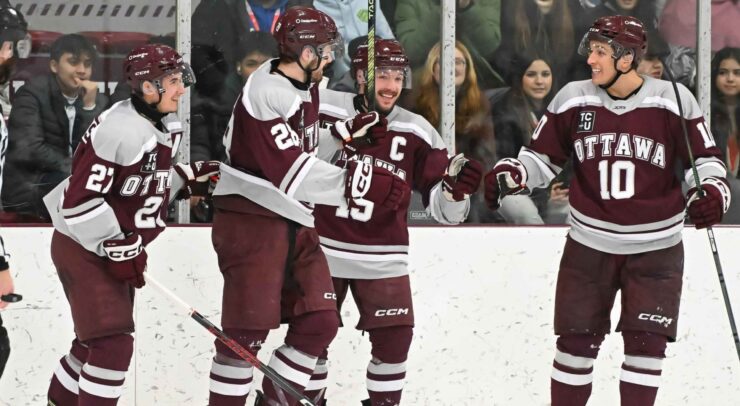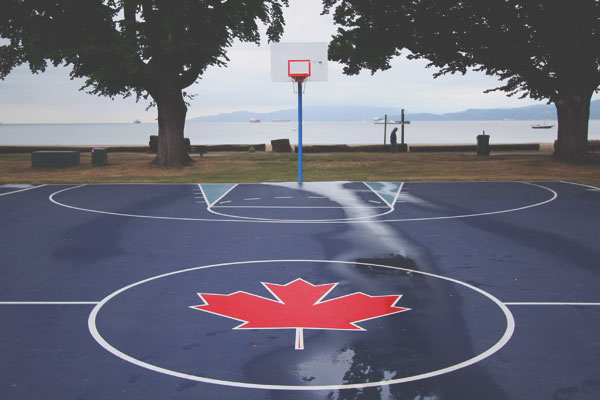Former U of O basketball star talks Europe, fans, and best memories in Ottawa
Photo courtesy of Freestyle Photography
In university, playing for a varsity team is typically the highlight of an athlete’s career, however there are a few that go on to make their dreams a reality and play at a professional level. Former Gee-Gee Warren Ward from London, Ont. played for the University of Ottawa men’s basketball team for five years and now plays professional basketball in Germany for TBB Trier.
The Fulcrum spoke with Ward about his new team, his life in Europe, and his best memories at the U of O.
The Fulcrum: What are the differences between the Gee-Gees and TBB Trier?
Warren Ward: Since I got here, I really like playing more with these guys. I find the professional atmosphere better for me. I can honestly say that I didn’t know these guys that long but I enjoy going to work with them everyday.
My house is big, a lot bigger than my basement apartment I lived in back in Ottawa. In terms of atmosphere, this country is beautiful. I think I was a little bit ignorant towards Germany because of its history. But it’s ironic because the knee sleeve I used to wear was made in Germany and when I bought it I didn’t know and now look where I am. I think it was a little bit of foreshadowing now that I look back on it. I think this is my new home.
Was it an easy transition when you moved to Trier?
Yeah, it was, because of my teammates. As soon as I got here I was welcomed and even before I got here I was welcomed. When I did arrive, it was nothing but love. No complaints; I think my character fits in well here. I think everyone on this team has a really great character so it makes it easy to work hard and you don’t want to let people like that down.
Did you sign a contract and if so, for how long?
I signed a two-year contract with this team and I have opt outs, meaning if another team wants me in a higher league and is paying more money, I can leave but I think the perks of this team are much better. A lot of professional teams in Europe are not very team orientated. This team is different, we have our own chat group and it just feels like a college team. A lot of the other guys in Europe that I have spoken to never had it like that. I think I will play my full two years here and who knows where I might end up after that, but I don’t have any intention of leaving.
How does it feel being in Europe?
WW: A blessing to start, to be over here and it’s pretty much free of charge. I don’t pay for anything. It’s different, even though it’s six hours ahead; I say it’s twelve hours behind North America because people are humbler and nicer; they take the time and enjoy a lot of things. For instance, their food—everyone here eats really slowly. Everyone sips their tea or cappuccino and everyone interacts with different ages, they enjoy their life. People are more relaxed, and that can definitely influence you.
How are the fans in Germany?
The fans are nuts—absolutely crazy. We went to Lutzenberg and France already and they come with their jerseys and their children. A normal game is 4,000 people and a big game is a sellout, which is about 6,000 people. They are good; they add me on Facebook a lot and send messages to tell me how happy they are that I’m here, and they don’t know me. It’s very nice.
How is your new coach?
His name is Henrik Rödl, and he’s a player’s coach. I like playing for him 100 per cent. I have no complaints about him; he has so much patience with me and thinks really highly of me. He demands a lot. He lets me play my own game and encourages my moves and things that I do on the floor; he doesn’t tell me not to do them. On top of that, he is a big family man like myself. He is laid back, but is the type of guy I don’t want to disappoint.
Do you have plans to do anything outside of basketball?
Yes I do. Actually, tomorrow I have a little debut as a DJ. Music is a passion of mine and I’ve always wanted to do that. I have been reading like there’s no tomorrow and in terms of a job, I don’t really know. But music is the number one. I may do an online course, not now but next year and do a master’s degree in media relations. In terms of a job I would love to do what you’re doing right now—interview people.”
What is your fondest memory of the University of Ottawa and Gee-Gees basketball?
All the parties and fun we had off the court. And on the court: winning the bronze medal [at Nationals] and my first ever career high. It was the first time my godfather saw me play basketball. We were at the University of Toronto and I had one of those crazy games. His daughter lost her husband that year so it was the first time I saw him smile in nine months and that’s why it was a big deal for me.
What did being a Gee-Gee do for you as a person and for your career?
Being a Gee-Gee taught me a lot about myself. All my injuries that I had to sustain, it taught me that I could overcome them. I think when I came there I had a reputation for being cocky and it probably still stands, but I think I showed that I can back it up because I played every game and stayed academically eligible throughout my five years and I am proud of that. I am proud of going to school there, and to overcome all of that type of stuff was great.
Last but not least, it taught me about leadership. I had to be a leader of the team my last three years and I didn’t know how to do that. I was never a captain and I was probably too scared to admit it to anyone that I didn’t really know what it took. Now I have an idea and I carried that with me.




